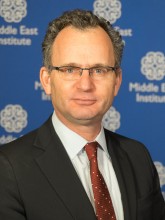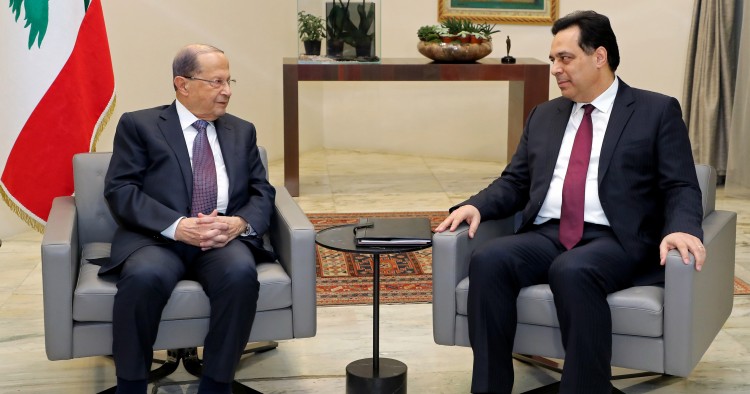This week's briefing on recent news and upcoming events in the region featuring Paul Salem, Hafsa Halawa, Marvin G. Weinbaum, Anne-Linda Amira Augustin, and Gerald Feierstein.
Lebanon: The twilight of an impotent government
Paul Salem
President

As I wrote on the day it was formed back in January, “This government is likely to be short lived, to preside over a steep decline in the economy … and growing social and political unrest in the country.” Indeed, this government was appointed to fail; if the oligarchy had the will and vision to undertake the reforms necessary to avert the crisis and turn the economy around, they would have done it and taken the credit themselves.
The currency is in free fall, the economy is contracting by more than 25 percent, and hundreds of thousands are hurtling into poverty, as the government has undertaken no serious economic reforms, nor made any progress on existentially urgent talks with the IMF. And this while the country has gone back into lockdown as COVID resurges, and as Hezbollah and Israel are again at risk of stumbling into another war. The current government led by Hassan Diab is unravelling. The foreign minister, Nassif Hitti, resigned today. It took Hitti, a very decent man in a very corrupt political system, only six months to give up hope of positive change and denounce the paralysis of the government. Other resignations may follow, and his departure comes after those of two key officials at the Ministry of Finance: the director-general and a senior economic advisor.
The current government is already largely impotent, since all the significant levers of power are still in the hands of the oligarchy that appointed them and that control the presidency and parliament. If more than a third of ministers resign, it will be officially a caretaker government; at that point, it will not even have the constitutional authority to make substantive policy decisions, even if it wanted to. And as the oligarchy continues to deflect responsibility for the crisis, bicker over control of dwindling spoils, and show no signs of moving toward any significant reform, it is unlikely that a new government could be formed any time soon. And thus the country will likely proceed to a full unravelling — social desperation and unrest, state failure, possible armed conflict, and desperate refugee flows.
The large uprising and protest movement that started in October of last year has been the glimmer of hope in this dark crisis. Groups within this broad civil society movement have been meeting fervently to consolidate their efforts and agree on urgent next steps. As some are arguing, the movement should call for an immediate national strike and protest to force the resignation of this government and the empowerment of a government of capable figures that are independent of the current oligarchy. This government must be given extraordinary decision-making and legislative powers in order to undertake urgent social support measures, implement rapid and large-scale economic reforms, and negotiate a recovery plan with the IMF and the international community. Only then can the country slow its slide into ruin, and start along the long road of recovery.
@paul_salem
PM al-Kadhimi announces early elections in Iraq
Hafsa Halawa
Non-resident Scholar

Last Friday, amid renewed protests and anger at continued violence on the part of security services, Prime Minister Mustafa al-Kadhimi announced a date for new federal parliamentary elections in Iraq, to be held on June 6, 2021.
Unsurprisingly, the announcement was met with a mixed response. Entrenched political actors argued the announcement was unconstitutional, requiring approval from Parliament to set an election date (and dissolve the sitting Parliament), while protesters reacted with cautious optimism. Speaker of the Council of Representatives Mohamed Halbousi attempted to engage protester optimism by calling for an urgent session of Parliament to complete outstanding legislation for the elections, challenging the body to hold elections even earlier than the date set by the PM.
On a technical level, planning elections is a complicated and arduous task, especially as Iraq looks set to change its corrupt party list system to one of individual candidacy. A law already exists, though protesters argue it doesn’t go far enough to eradicate the party dominance of elections. Some MPs have already publicly criticized the option of running in elections as independents, before registering or shifting support to a party bloc once elected, dealing a significant blow to the belief that new candidacy rules could improve the current system.
In any case, the package of electoral laws required is incomplete, and changing the electoral architecture will be a complex undertaking that will face a number of challenges, particularly as it relates to fair and representative electoral districts (based on one person, one vote) and preservation of the constitutional requirement for 25 percent female representation in Parliament. Both issues are likely to be highly contentious as debate begins on the draft law. Furthermore, ongoing debates over funding for the Independent High Electoral Commission and amendments to the composition of the Federal Court have already proven to be politically divisive.
On a political level, an early election brings with it risks for the protest movement. It remains to be seen whether protesters will be able to organize themselves into a more cohesive political movement or promote new, more inclusive, and diverse political actors. While the timeline now presented may satisfy their original demands, it is also expected to hinder their progress in the short to mid-term. This will be exacerbated if Parliament heeds Speaker Halbousi’s calls to hold elections even earlier than the proposed date.
Meanwhile, the current political elite will look to organize and ostracize protesters from engaging, possibly attempting to use a fast-tracked timeline to impose themselves once again in the elections and cement their continued grip on power. This could result in a split of the protest movement, as actors decide whether or not to engage in politics. Some actors may find themselves co-opted by the current elite, or out-funded in forthcoming political campaigns with much less time for organizing and fundraising. Others — possibly even the bulk of the youth movement — may simply continue to disengage from the political process and promote widespread voter boycotts. All of these options, however, will continue to threaten Iraq’s fragile transition to democracy in the long term.
Inching toward Afghan peace talks in Doha
Marvin G. Weinbaum
Director for Afghanistan and Pakistan Studies

The prospects for intra-Afghan talks, having risen and fallen multiple times, seem to have brightened with several recent developments. Meetings between the Taliban’s self-designated Islamic Emirate and a Kabul government-approved delegation that were slated to begin in March have remained in abeyance while a prisoner exchange dispute has gone unresolved. But recent movement on the issue together with the Taliban’s proclamation of a three-day ceasefire over Eid al-Adha have renewed hopes for negotiations. In accordance with a provision of the Feb. 29 U.S.-Taliban agreement, the Taliban announced last week their fulfillment of a commitment to free 1,000 government prisoners. This was soon reciprocated with President Ashraf Ghani’s release of an additional 500 Taliban prisoners, bringing the total to more than the 5,000 prescribed by the bilateral agreement.
Even so, the two delegations will not be convening in Doha quite yet. There remains undecided what has been until now the major sticking point holding up talks, the disposition of some 400 prisoners the Taliban insists must be included among the 5,000. The Ghani government has held them back due to their involvement in serious terrorist acts and other crimes. But pressure has been mounting on Ghani. The U.S. point man on the Afghan peace process, Zalmay Khalilzad, has leaned heavily on the government to fully honor the terms of an agreement that he, and not the Afghan president, had signed. The peripatetic diplomat has recently completed another of his country tours meant to enlist international backing for early negotiations. This has produced some incredulous suggestions for breaking the deadlock. The Norwegians advised that the 400 be held in detention by a joint team of Taliban and government forces. Another recommendation would have the prisoners turned over to the Taliban on the promise that they would be held under house arrest until their futures were determined.
But last Friday it was Ghani himself who proposed a possible way forward by offering to consult with a Loya Jirga over the prisoners’ future. Turning to this traditional Afghan institution could give the Afghan president a face-saving way out. Ghani could of course use the Loya Jirga to ratify his prisoner policy. If he however yields to the Taliban’s demand, citing the advice of the consultative body, it would once again demonstrate that whatever the issue, in the end it is the government that gives way. While an impatient Afghan public and international community would almost certainly applaud Ghani’s decision, it may create a bad precedent for the intra-Afghan talks.
This article was co-authored by Sawera Khan, Hamid Safi, and Jack Stewart, research assistants to Marvin G. Weinbaum.
@mgweinbaum
Yemen: Progress on the Riyadh Agreement
Anne-Linda Amira Augustin
Non-resident Scholar

After more than two months of renewed negotiations on the implementation of the Riyadh Agreement, a delegation from the Southern Transitional Council (STC), headed by President Aydarus al-Zubaydi, and the Hadi government made gentle progress. On July 29, 2020, the STC retreated for the time being from its declaration of self-administration, effective from the end of April. The late April declaration was a result of the STC’s discontent with the government’s inaction in dealing with the COVID-19 pandemic, the flash floods that hit the South Yemeni coast, and the worsening humanitarian situation on the ground, as well as with its extreme corruption.
The decision to step back from the declaration was taken in Riyadh after Khalid bin Salman, the Saudi deputy defense minister, assured the STC delegation that a new cabinet of 24 ministers, 12 from the North and 12 from the South, would be formed in the coming month. The 12 southern positions are supposed to incorporate a significant number of STC and pro-STC staff with direct ministerial representation. This would ensure the involvement of southern leaders who are ready to take decisions that matter to South Yemen and are willing to advocate for the people in the South and the southern cause. Furthermore, and as a first step, STC Secretary-General Ahmed Hamid Lamlas from Shabwa was appointed the new governor of Aden. Also, on the suggestion of the STC, Gen. Ahmed Mohammad Salim al-Hamedi from Hadramawt was designated the city’s head of security.
These latest developments, however, do not imply a retreat from the STC’s primary objective, which is the reestablishment of an independent South Yemeni state in its pre-1990 borders, as STC Presidential Council member Amr al-Bidh has made clear: “The fact that we have now agreed has nothing to do with our goals.” As part of the cabinet, the STC wants to guarantee its involvement in the UN-led peace process, which, until now, has only included the Houthis and the Hadi government as negotiators at the table, even though there are many more political and military stakeholders, as well as civil society actors, on the ground. The next month, however, will show whether the government is willing to integrate the STC into a new cabinet or if the implementation of the Riyadh Agreement will once again fail, as it did earlier this spring.
Hajj restrictions are a blow to Saudi self-esteem
Gerald Feierstein
Senior Vice President

Saudi Arabia’s reluctant decision to limit attendance at this year’s hajj due to the global pandemic is a blow to the kingdom’s self-esteem but should cause little long-term, tangible damage. Although the hajj has been disrupted dozens of times over the centuries, including as a result of epidemics, this is the first time that it has been suspended since the al-Saud gained control of the holy places. Saudi management of the hajj, including the billions of dollars spent to accommodate the ever-increasing participation in the annual ritual, has been a point of pride for all Saudis and a foundational argument for the Saudi monarch’s assumption of the title as Custodian of the Two Holy Mosques.
There has been little criticism of the Saudi decision in the Islamic world. Indeed, in advance of the Saudi decision in June, a number of governments had already announced that they would forbid their nationals from traveling to Saudi Arabia for the hajj. Currently, the number of new cases of COVID-19 is on the decline, and the Saudi government is reducing restrictions on movement there, but the kingdom has recorded nearly 300,000 cases so far, with some 3,000 fatalities attributed to the disease. To guard against further outbreaks associated with the hajj, the government put in place aggressive restrictions on those attending the pilgrimage this year, including testing and quarantining measures that would have been unachievable without restrictions on the numbers attending.
The restrictions on this year’s hajj will also have a temporary effect on the kingdom’s ambitious Vision 2030 plan for economic diversification. Earnings associated with visitors to the kingdom for the hajj and umrah are relatively modest, estimated at some $12 billion/year, but promoting tourism, including religious tourism, is an important pillar in the diversification strategy and an anticipated major source of employment for young Saudis. Long-term loss of religious tourism will be a major blow to the Saudi plan as well as to its prestige and status as a leader of the Islamic world. For that reason, the Saudis will do everything possible to ensure that the disruption to this year’s hajj will be a one-time event.
@j_feierstein
The Middle East Institute (MEI) is an independent, non-partisan, non-for-profit, educational organization. It does not engage in advocacy and its scholars’ opinions are their own. MEI welcomes financial donations, but retains sole editorial control over its work and its publications reflect only the authors’ views. For a listing of MEI donors, please click here.












